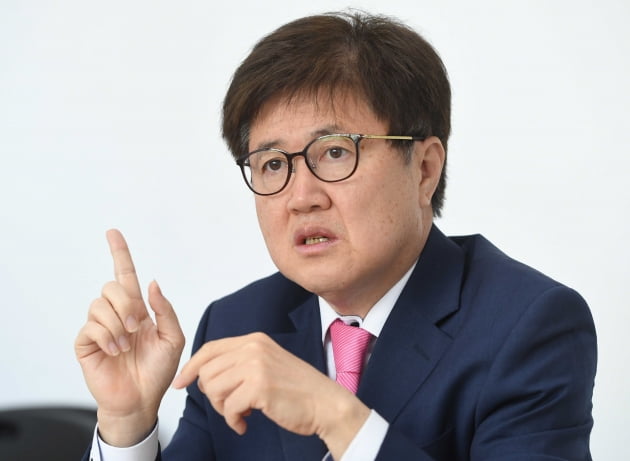Rep. Gyeong-Jun Yoo releases 2020 OECD tax analysis
The share of corporate tax in Korea is 1.5 times that of OECD, and property tax is twice as much.
![[단독] Reimbursement of tax revenue with punitive taxation... Korea property tax OECD 3rd](https://i0.wp.com/img.hankyung.com/photo/202102/01.25487979.1.jpg?w=560&ssl=1)
Criticism has been raised that the proportion of property tax and corporate tax in Korea is excessively higher than the average of the OECD member countries. It is an analysis that the results of various welfare and large-scale social overhead capital (SOC) development from a few specific classes such as the rich and large corporations were reflected. There are also concerns that if the tax structure is not corrected, the tax base may be reduced and the economy may fall into a vicious circle.
◆ Symptoms are also populism
According to the ‘2020 OECD Tax Handbook Analysis Report’ released by Congressman Gyeong-jun Yoo (photo) on the 23rd, the proportion of property tax in Korea’s total tax revenue was 11.6%, about twice the average of OECD member countries (5.6%). Among all 37 OECD member countries, it is the second highest share after the United Kingdom (12.5%) and the United States (12.3%). The corporate tax share (15.7%) was also more than 1.5 times higher than the OECD average (10%). Compared to the United States (4.1%) and Germany (5.6%), which have many companies competing with Korea on the global stage, it is about three times higher.
The remaining four major tax contributions fell short of the OECD average. The share of income tax was 18.4%, which was 80% of the OECD average (23.5%). It is ranked 25th among all OECD countries. The share of VAT (15.3%) and social security contributions (25.4%) also ranked 29th and 24th, respectively.
Experts diagnosed this tax structure as “the result of reliance on some classes, such as high-income brackets and large corporations, for welfare resources, which are rapidly increasing due to low birthrate and aging,” (Dong-geun Cho, professor of economics at Myongji University). The actual welfare budget is increasing rapidly. In the four years from 2017 to 2021, when the Moon Jae-in administration was established, about 22 trillion won (64%) increased. There are opinions that the government should also discuss general measures to increase taxes, such as VAT and income tax, in order to “duplicate heavy burdens” at the level of advanced countries. KDI, a state-run research institute, said in a regular report in November of last year, “It is necessary to prepare a plan in advance to strongly control the rate of increase in national debt when the economy recovers in the future.” “We discuss ways to secure fiscal income through tax increase in the long run. I need to do it.”
The government and politicians are passive about these measures. This is the reason for increasing taxes for the rich and large corporations with relatively little tax resistance. In fact, the government raised the highest income tax rate and the highest corporate tax rate in 2018 by 2 percentage points and 3 percentage points, respectively. The comprehensive real estate tax rate imposed on high-priced homeowners has doubled from this year (0.6-3.2% → 1.2-6.0%). In the midst of rising house prices, the burden of property tax is also increasing as the public price, which is the tax base, has been raised.
◆Tax burden shrinks private economy
The deformed tax structure reduces the vitality of the economy. Corporate tax is representative. Hong Ki-yong, a professor of business administration at Incheon University, explained, “Despite a corporate tax increase in 2018, the corporate tax collected last year decreased by 16.700 billion won (23%). Even if the tax rate is raised, it clearly shows that if the private growth engine falls, the tax revenue will decrease.” Conversely, it means lowering the tax burden and easing regulations to attract investment incentives for companies to increase taxes. Professor Hong added, “The corporate tax burden is also a factor that makes investments by global companies at home and abroad.” Too many tax-free people who do not pay any taxes are also pointed out as a problem. As of 2018, 39% (7.2 million) of all earned income workers were tax-free. The proportion of tax-free corporations that do not pay corporate tax also approaches 49%. Rep. Gyeong-joon Yoo said, “You need to be able to understand the income to properly support the victims of Corona 19, but since there are many tax-free, we cannot properly determine the target and size of the support.” It’s going on.”
There were also voices of concern about financial soundness. The atmosphere is spreading to expect government support without paying taxes. The megaton level of welfare pledges are pouring out in the politics right now ahead of the next presidential election. Gyeonggi Governor Lee Jae-myung, the No. 1 candidate in the presidential elections across the opposition parties, promised to give out a basic income of 1 million won per year. It also revealed a plan to gradually increase this basic income by 500,000 won per month to 6 million won per year. It is a pledge of 86 trillion won per household and 311 trillion won per person every year. Lee Nak-yeon, a rival of the governor, and the Democratic Party’s representative recently promised welfare pledges such as an increase in child allowance and injuries and sickness allowances. Special laws for large-scale SOC projects such as the Gadeokdo New Airport Special Act are also being followed. Professor Hong Ki-yong emphasized, “The fiscal soundness of a country whose growth rate is slowing due to low birthrates and aging populations can deteriorate in an instant,” and emphasized that “an atmosphere in which not only welfare pledges but also financial resources are considered should be created.”
Reporter Dongwook Jwa [email protected]
Ⓒ Hankyung.com prohibits unauthorized reproduction and redistribution
